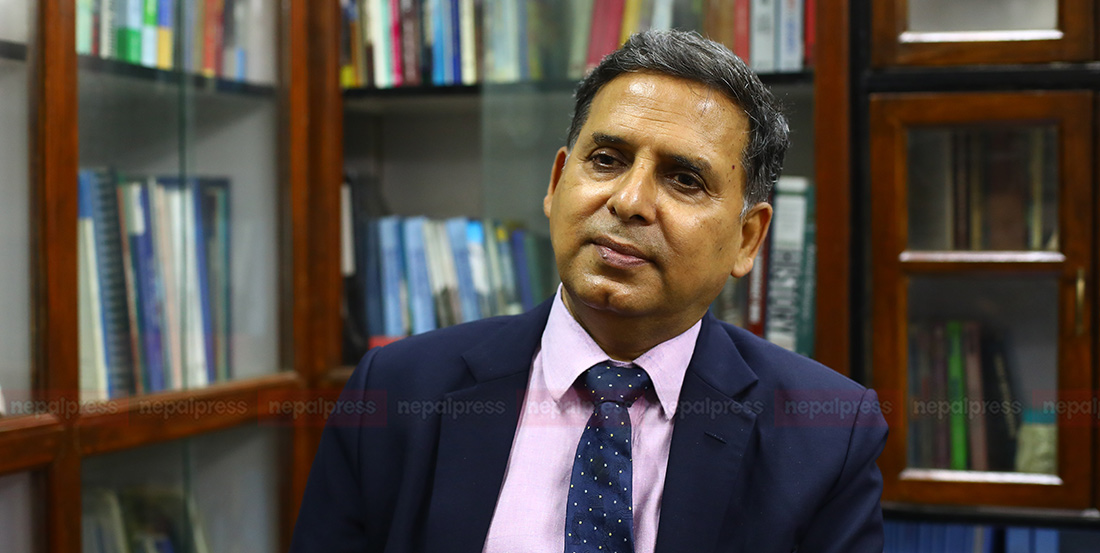Bipin Adhikari is a constitutional expert. His opinions in the field of constitutional law, human rights, legal reforms and democratization process are widely reported. A Doctor of Constitutional Law, Adhikari is working as a freelance lawyer supporting the ongoing constitution making process in Nepal. Recently, Adhikari spoke to SPOTLIGHT about the controversies regarding the form of government that Nepal should adopt through the Constituent Assembly. Excerpts:
Why do you consider the Westminster model of the parliamentary system as still the best choice for Nepal?
The history of democracy in Nepal is the history of parliamentary democracy. In particular, the1990 constitution, based on the outstanding ability of all political forces, was able to take democracy to every household in far flung villages. Almost every adult in this country knows the basics of the system after all these years. They know how it operates. It is already rooted in the conscience of the people. For most of the people, democracy means parliamentary democracy and nothing else. The greatest advantage is that most of the politically active people know where the shoe pinches, and what should be on the agenda of constitutional reform to fix the shoe and make it smooth. There is no reason why they should be offered something that will require another 50 years of experimentation. Moreover, it is the parliamentary system which can facilitate diversity, social inclusion and multiple leadership more than any other alternative before the nation.
Is the American system bad?
I don’t say that. Americans have one of the best political systems in the world. It has worked for them so well. However, this does not prove anything for Nepal. We operate in different conditions. We have different mindsets. We don’t have good accountability culture.
So …?
So, in this scenario, there are potential dangers in their replication here. Many executive presidents have developed dictatorial tendency, and spoiled the democratic system. The winner-take-all character of the office is also a problem. It is for the same reason that I have said the system of the directly elected prime minister within the set up of unicameral legislature is also risky.
In principle, one can compensate for this by devising a proper electoral system, presidential powers, and legislative organization and procedures. There are ways to structure the decision-making process in presidential democracies so as to neutralize most of the centrifugal forces that may operate in these regimes.
But then this means we will have to try everything anew. This means starting a new experiment once again. The question is should we start everything afresh – or try to learn from our own experience?
Does it make a case for continuation of the parliamentary system? If you go by recent history, you will find that parliamentary democracies are doing a lot better than presidential democracies. This is what the Freedom House political index generally shows.
It is true in the case of the developing countries as well. India is a very strong example. There are countries like Botswana and Papua New Guinea showing encouraging records. They all are now institutionalized. But most of the new presidential democracies have suffered some form of breakdown. Overall, parliamentary systems have three times the rate of survival over presidential systems.
But there is a debate in India as to the need of switching over to the presidential system?
Yes, we find references about it now and then. Many constitutional experts have suggested a changeover to the American system. Some want small, professional administration, which doesn’t depend on parliament. Other experts go further – and suggest Washington-style presidency. B ut the country’s main political parties remain divided on the most suitable form of government. The truth is they have been learning from their own experience. And they are doing very well. Our problem is we pick up only bad examples from India, not the most encouraging ones.
Why did the parliamentary system fail in Nepal then?
Certainly a wide range of factors come into play, and it would be unwise to generalise too starkly from macro data.
The problem of Nepal was not the defective constitution for sure. It was not the low levels of income per capita either. At this level of interference from outside, any form of government will come to its knee. A change in the government system doesn’t mean waving a magic wand and healing the problems and ills of our region.
Why parties like Maoists and MJF have been advocating for presidentail system? Even UML and a section of Congress people have been arguing for the directly elected prime ministerial system? There must be some reasons.
It is very funny. Maybe personal ambitions; or they don’t care at all. Maoists in particular have strange thoughts. I have not seen any political party in Nepal ever researching on what form of government might suit this country, or taking any intellectual feed back from one of the available academic institutions. They seem to be oblivious of the multi-ethnic character of Nepal, and so much of politicisation in the country.


